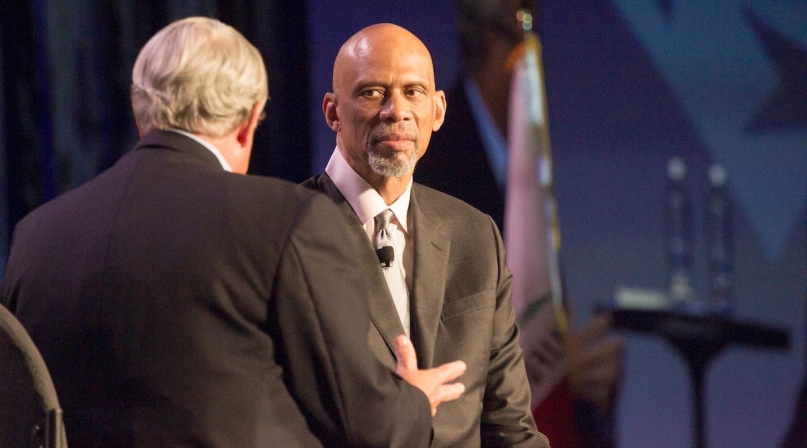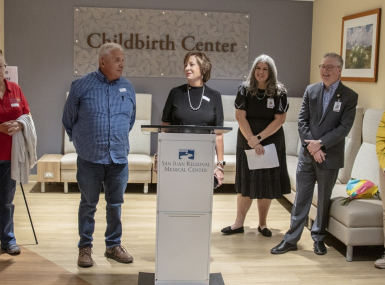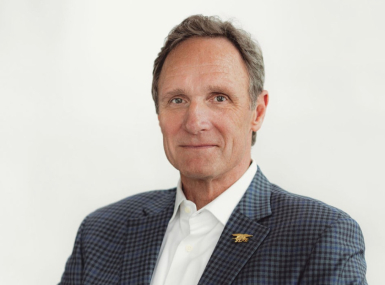Leadership Edge - Aug. 8, 2016
Upcoming Events
Related News

Kareem Abdul-Jabbar shares his thoughts on a divided America
Kareem Abdul-Jabbar, who spoke at NACo’s 2016 Annual Conference, reflects here on his experience as a noted athlete, writer and filmmaker.
Q:There must have been a lot of expectation on the basketball court because of your height. Yet, you’ve often said you weren’t very good at first. What motivated you to become so good?
KAJ: My parents expected excellence from me. Not in a harsh or demanding way, but in a supportive way because they knew how hard the world was on black men and women. They wanted me to enter adulthood with as many tools for success as possible, both academic and athletic. Their support inspired me to do my best.
Your involvement with the Civil Rights Movement began at an early age. What are some of the experiences you had that led you to this commitment?
KAJ: Every person of color in this country has stories of discrimination, hate speech or even violence directed at them. It’s hard for whites who’ve never experienced this to understand how it’s a daily concern. It’s like walking through an amusement park haunted house, knowing something’s going to jump out at you, just not knowing when. Your nerves are always on alert. It’s that general feeling of never feeling completely safe or valuable that prompted my involvement. Yes, there were specific moments that inspired me: meeting Martin Luther King, Jr., being accidentally caught up in a Harlem race riot and having to run for my life, and racial slurs and taunts from the sidelines of basketball games. But my commitment is based on a deep regard for the U.S. Constitution and making sure we live up to the noble words we claim to love.
Your conversion to Islam in 1971 when you were 24 caused a lot of controversy. How did you deal with the backlash from the public?
KAJ: I’d already had some experience dealing with racial backlash and I’d seen what had happened to Muhammad Ali when he announced his conversion to the Nation of Islam (which is not at all what I’d converted to, though to most people who didn’t know better, it was the same). So, I was somewhat prepared. I wasn’t quite prepared for some of the resentment from other African Americans. The main way I dealt with it was to show everyone that my faith was genuine and to reach out to others in peace and openness. I focused on our common goal of bringing people together in tolerance and respect and in turn that’s what I received. Most of the time.
Do you think professional athletes are under an obligation use their celebrity to address controversial issues?
KAJ: Yes, but with some caution. Athletes need to be sure about positions they take because once it’s out in the public, it will be up for intense scrutiny. As it should be. Celebrity is not a free pass to spout any kind of nonsense. Be sure of your facts and the logic of your position before announcing it publicly. Once you are sure that your position is well-supported, you are obligated to use your renown to better the community.
How did you deal with the pressure of being a role model for people of color?
KAJ: That is one of the hardest — and most rewarding — challenges of my life. Any flaw I showed was sometimes magnified in the public’s perception to indicate that all people of color were this way. But my successes were sometimes attributed to breaks I got because I was black. It’s a Gordian Knot that all black celebrities must unravel for themselves. Yet, despite that, we can’t shirk from going out there and speaking up for what’s right. It’s tempting for some to just nod and smile and express gratitude for what has been given them in the hopes they don’t rock the boat or risk their popularity. But that’s not being a role model to blacks; that’s being a role model that some whites want to promote to show everything’s okay in America. No racism here. But things aren’t okay. And it’s the job of successful people of color to help make it okay.
You have been outspoken in your articles and your new book about how institutional racism has negatively affected our country, especially opportunities for African Americans. What are some of the solutions you propose to help move us forward?
KAJ: One solution is to make the public more aware of where the racism is and how it undermines not just opportunities for people of color, but for economy of the country. Polls show that many whites think they’re more discriminated against than blacks, despite every reputable study ever done. That perception is deliberately perpetuated by those looking to gain political power off the backs of the fearful. The truth will empower everyone to fix our problems rather than pretend they don’t exist. The man who ignores that crusty black, bleeding mole is not going to get better.
After retiring from professional basketball, you could have continued hanging around sports like so many others have. But you chose to embark on a writing career in both fiction and nonfiction. What made you take on such a risk, knowing you could have flopped terribly?
KAJ: The most important ingredient to success is to not be afraid to fail. As Wayne Gretzky said, “You miss 100 percent of the shots you didn’t take.” The other important ingredients are preparation and passion. I’ve been writing my whole life, so I was prepared. Plus, I love reading and writing as much as I did playing basketball. I get to explore so many wondrous things. One day I’m writing about the Harlem Renaissance, the next I’m writing about how The Game of Thrones reflects our current political situation.
Much of your writing about pop culture and politics is about encouraging Americans to live up to the principles of the U.S. Constitution. Whether it’s race, religion or gender, we seem radically divided as a country. What do we need to do to come together?
KAJ: Be less afraid. Less afraid of people who look different, or sound different, or eat different foods. Less afraid of people who love differently or worship differently. We’re so afraid of losing what we have that we fail to embrace when change can make us stronger, more prosperous, happier. Thomas Jefferson once defended freedom of religion in America by saying, “But it does me no injury for my neighbor to say there are twenty gods or no God. It neither picks my pocket nor breaks my leg.” This same philosophy applies to so many things that divide us. Living in fear eats away at people until they will trade their ethics, their freedom, even their humanity for a false sense of security.
If you would like to preorder KAJ's new book, "Writings on the Wall" visit www.kareemabduljabbar.com
Attachments
Related News

Now I know I can adapt my communication style
San Juan County, N.M. Commissioner Terri Fortner spent her career working with people one-on-one, but she overcame hangups about online communication when the pandemic forced her onto video calls when she first took office.

County service meets a veteran’s need for purpose in Spotsylvania County, Virginia
After Drew Mullins transitioned from a high-performance lifestyle in the military, he found the environment and purpose he sought when he took office in his county.
Now I know that solid waste is complicated
Custer County, Idaho Commissioner Will Naillon says solid waste removal is "one of the things that people often take for granted until it’s their job to make sure it happens... that’s the story of being a county commissioner."